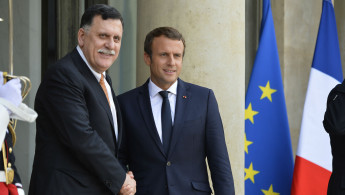Paris conference on Libya risks being 'counterproductive'
A Paris conference on Libya has been criticised for failing to seek a broader consensus in the country.
2 min read
The conference hopes to secure a commitment towards elections (Getty)
A Paris conference seeking a political roadmap for Libya is at risk of being "counterproductive" for the conflict-riven country, the International Crisis Group warned Monday on the eve of the gathering.
The conference will bring together Prime Minister Fayez al-Sarraj, head of Libya's UN-backed unity government in Tripoli, and 75-year-old military strongman Khalifa Haftar, whose rival Libyan National Army dominates the country's east.
Paris hopes it can secure "a collective commitment to do everything so that elections (presidential and parliamentary) are held by the end of the year", the French presidency said Monday.
But the International Crisis Group think-tank said the format of the negotiations puts them at risk of having the opposite effect.
"Negotiating through individual personalities without ensuring a broader consensus across the political and military spectrum is likely to be counterproductive," the ICG said in a statement.
The think-tank pointed to the absence of a delegation from Misrata, which has the most powerful armed groups and the most influential politicians in western Libya.
"A number of other Libyans have been invited to attend on the margins but will not be asked to sign the agreement," said the ICG.
It said this approach had caused "resentment among some Libyans".
"A delegation from the city of Misrata... refused to travel to Paris when informed they would not be treated on par" with the main delegations, said the ICG.
It called for a more open approach and to consider not seeking a signed agreement for now.
"They could use the event to push Libyan leaders toward compromise and a divided international community toward greater convergence through a broader declaration of principles on political, security and economic steps that would help stabilise and unite the divided country," it said.
The conference will bring together Prime Minister Fayez al-Sarraj, head of Libya's UN-backed unity government in Tripoli, and 75-year-old military strongman Khalifa Haftar, whose rival Libyan National Army dominates the country's east.
Paris hopes it can secure "a collective commitment to do everything so that elections (presidential and parliamentary) are held by the end of the year", the French presidency said Monday.
But the International Crisis Group think-tank said the format of the negotiations puts them at risk of having the opposite effect.
"Negotiating through individual personalities without ensuring a broader consensus across the political and military spectrum is likely to be counterproductive," the ICG said in a statement.
The think-tank pointed to the absence of a delegation from Misrata, which has the most powerful armed groups and the most influential politicians in western Libya.
"A number of other Libyans have been invited to attend on the margins but will not be asked to sign the agreement," said the ICG.
It said this approach had caused "resentment among some Libyans".
"A delegation from the city of Misrata... refused to travel to Paris when informed they would not be treated on par" with the main delegations, said the ICG.
It called for a more open approach and to consider not seeking a signed agreement for now.
"They could use the event to push Libyan leaders toward compromise and a divided international community toward greater convergence through a broader declaration of principles on political, security and economic steps that would help stabilise and unite the divided country," it said.





 Follow the Middle East's top stories in English at The New Arab on Google News
Follow the Middle East's top stories in English at The New Arab on Google News
![Israeli forces ordered bombed Gaza's Jabalia, ordering residents to leave [Getty]](/sites/default/files/styles/image_330x185/public/2176418030.jpeg?h=a5f2f23a&itok=_YGZaP1z)

